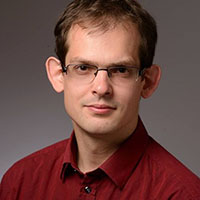
Márton Levente Horváth
Composer, organist
Horváth Márton Levente was born in 1983 in Tapolca. He completed his elementary music studies in Pápa and Balassagyarmat. At the Bartók Béla Conservatory of Music in Budapest, he studied composition with István Győr Fekete and organ with Zsuzsa Elekes. He became a student at the Franz Liszt Academy of Music in 2001. His professors were János Vajda (composition) and Gábor Lehotka (organ). After obtaining his diplomas in 2006 and 2007, he joined the doctoral school at the Franz Liszt Academy of Music in the keyboard program. He earned his doctoral degree in 2014. He practices both as a composer and an organist. Between 2003 and 2013, he was the organist at the St. Ladislas Church in Budapest-Kőbánya and the organ accompanist for the St. Ladislas Choir. Since 2010, he has been teaching in various institutions: between 2010 and 2019 at the Kodály Zoltán Hungarian Choral School; since 2015 as a part-time organ teacher at the Liszt Ferenc Academy of Music at the Church Music Department, where he has also been an adjunct professor since 2018. Between 2016 and 2017, he was an adjunct professor at Pázmány Péter Catholic University, and since 2017, he has been a teacher of composition at the Bartók Béla Conservatory of Music. Since 2022, he has been the choirmaster and organist at the St. Anna Church in Szervita Square, Budapest. In 2016, he was awarded the Erkel Ferenc Prize in recognition of his compositional work, and in 2017, he received the award from the Hungarian Federation of Choirs, Orchestras, and Folk Ensembles (KÓTA Award). In 2020, his orchestral work titled “Scrollin’” was chosen as the Classical Music Piece of the Year by Artisjus.
As a composer… He won the first prize in the Liszt Ferenc Academy of Music’s in-house composer competition in 2002 and 2004. In 2003, he participated in Betsy Jolas’ composition masterclass in Villecroze, France, and then in 2004 and 2005, he received a scholarship from the Académie Musicale de Villecroze. With the help of this scholarship, he released his album titled “Till Now” in 2005, which was published by Hungaroton. He received the Kodály Zoltán Artistic Scholarship for three years (2008, 2009, 2010). His works have been performed at various Hungarian festivals (Művészetek Völgye, Korunk Zenéje, Mini-fesztivál, CAFe Budapest, Szegedi Vántus Napok). His works have been performed by distinguished artists such as the Liszt Ferenc Chamber Orchestra, Budapest Strings, Budafok Dohnányi Symphony Orchestra, Honvéd Male Choir, Hungarian Radio Music Ensembles, Concerto Budapest, Savaria Symphony Orchestra, Somogyi String Quartet, Krulik Quartet, Rohmann Ditta, Seleljo Erzsébet, or Klenyán Csaba. In 2022, his Kolozsvár Mass was presented at the rededication of the renovated St. Michael’s Church in Kolozsvár. His most famous work is the motet “O salutaris hostia,” which is sung worldwide. His works have been presented in numerous countries (Austria, Czech Republic, France, Lebanon, Macedonia, Mexico, Germany, Norway, Romania, Slovenia, USA).
As an organist… He gave his first solo concert in 2001 and has been performing regularly since then. The year following his graduation (2007), he was awarded the Fischer Annie Performance Scholarship. He attended several internationally renowned organist courses (Ludger Lohmann, David Titterington, Szathmáry Zsigmond), and participated in three courses by Olivier Latry, organist of Notre Dame in Paris (2003, 2004, 2008).
Marton Levente Horvath’s repertoire is very diverse; he has presented hundreds of works from the early Baroque to the present day. In his concerts, he mostly performs works by Bach, Buxtehude from the Baroque period, and works by Franck, Liszt, and Mendelssohn from the Romantic era. He pays special attention to popularizing 20th-century organ music. Among his favorite composers in the modern repertoire are the French composers Jehan Alain, Olivier Messiaen, and Charles Tournemire, as well as the German composer Paul Hindemith. He regularly performs his own organ works, but alongside these, he frequently presents works by 20th-century and contemporary Hungarian composers (Dohnányi, Lisznyay Szabó Gábor, Maros Rudolf). He has premiered numerous pieces by composers such as Gergely Barta, András Derecskei, Gyula Fekete, Árpád Kákonyi, Márton Kerékfy, Péter Zombola, and Ákos Zarándy. He was a performer at the Sochi Organ Festival in Russia twice (2009, 2011) and has performed in Austria, Norway, and Slovakia. He collaborates with numerous choirs, soloists, and orchestras as an organ accompanist, chamber partner, or continuo player. In 2011, under the direction of Zoltán Peskó, he performed Liszt Ferenc’s Christ Oratorio with the Hungarian Radio Music Ensembles in Paris. In 2021, he premiered his organ work “Madaradante” at the Hall of the Pontifical Institute of Sacred Music in Rome, and in 2022, he played Ákos Zarándy’s “Fin des Temp” and his own organ works as part of a European tour in Salzburg (Austria), Csíkszereda and Sepsiszentgyörgy (Romania), and Gothenburg (Sweden).
As a church musician… He has been actively involved in church music since the age of sixteen, considering his church music service as an intersection of his roles as a composer and organist. His compositional output includes numerous choral works specifically written for liturgical use. Since 2022, he has been the organist at the St. Anna Church in Szervita Square, Budapest, and the founding choirmaster of the church’s Te Deum Chamber Choir. His ecclesiastical music interests focus on the medieval, Renaissance, and contemporary choral repertoire.
Marton Levente Horvath’s doctoral dissertation is based on ecclesiastical music-historical research. Titled “A Genre in Illegality – Composition of Masses in Hungary between 1949-1969,” the work explores largely unexplored Hungarian church music for historical reasons in the mid-20th century. In 2017, the dissertation was expanded and revised for publication as a book.
Academic degree, university post: DLA, senior lecturer
Date, place of birth: 1983, Tapolca
Education:
